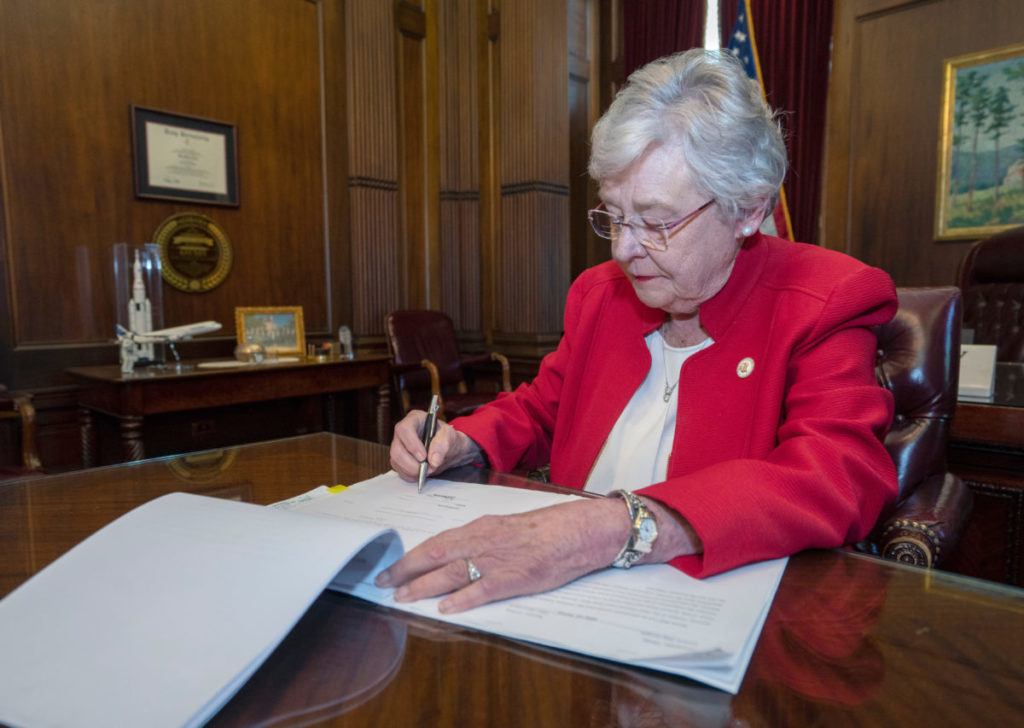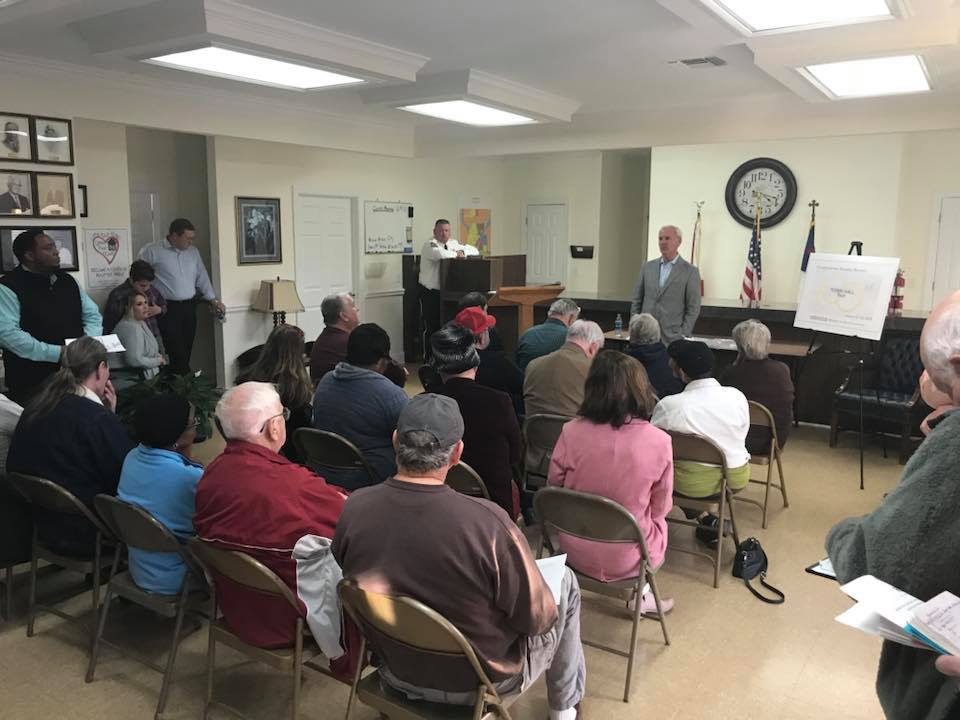Kay Ivey’s prison study group to make recommendations

One state senator said he expects a package of four to five bills to be introduced to the legislature.
Cam Ward to challenge Greg Shaw for Alabama Supreme Court seat

State Sen. Cam Ward announced Monday he will challenge two-term incumbent Justice Greg Shaw for a seat on the Alabama Supreme Court, setting up a significant Republican primary battle in 2020. Both men indicated they will file campaign paperwork with the Alabama Republican Party when qualifying opens this week. Shaw was first elected to the Supreme Court in 2008 and was re-elected in 2014. He previously served on the Alabama Court of Criminal Appeals from 2001-2009. He announced Friday that he would seek a third term. “I will once again ask the voters to place their trust in me to serve with integrity, impartiality and always place the law over politics,” Shaw said in a Friday statement. Shaw is a graduate of from Auburn University and Samford University’s Cumberland School of Law. His wife, Samantha Shaw, served two terms after being elected state auditor. A prominent member of the Alabama Senate, Ward is chairman of the Senate Judiciary Committee. He is best known for spearheading prison and criminal justice reform efforts and advocating for the autism community. “My judicial philosophy will be easy to understand. As a judge, my role will be to interpret the law exactly as it is written, not to write new ones,” Ward said in a statement. He is a graduate of Troy University and the Cumberland School of Law at Samford University. Ward was first elected to Alabama Legislature in 2002, serving first in the House of Representatives and later the Alabama Senate. Ward was arrested for driving under the influence in 2015 but completed a pretrial diversion program for first-time offenders. After his arrest, Ward issued a public apology and said he had been using alcohol as a “crutch.” The race will be one of several closely watched GOP primaries in March. Republished with the permission of the Associated Press.
J. Pepper Bryars: Like Chilton County’s peach trees, Alabama’s occupational license laws need regular pruning

Motorists who travel I-65 between Birmingham and Montgomery during summertime often enjoy the tradition of stopping in Clanton for a freshly-picked basket of Chilton County’s famous peaches. There’s something special about that part of Alabama, a Goldilocks zone that produces those thick, juicy, tasty treats. Not too cold. Not too hot. Just right. Well, that and an awful lot of pruning. Thing is, peach trees need to be cut back annually so that they can continually produce the best and most fruit. A snip here. A lop there. Just planting them and walking away isn’t enough. Kind of like laws, and there’s no better example of such a thing than those governing occupational licensing in Alabama. When we first began planting them decades ago, occupational licensing laws were meant to ensure that those who were practicing potentially dangerous professions were doing so safely. Those early measures covered around 5 percent of the U.S. labor force, according to a recent policy memo from the Cato Institute. But like an untended peach tree, they’ve been left to grow wild. “Alabama licenses a total of 151 occupations, covering over 432,000 Alabama workers, which represents over 21 percent of the state’s labor force,” wrote the authors of The Costs of Occupational Licensing in Alabama, a special report commissioned by the Alabama Policy Institute. The report found that the initial costs of occupational licensing are $122 million, with another $45 million for renewals plus $243 million in annual continuing education costs. Those costs are eventually passed along to consumers. Clearly, these laws are due for pruning, but Alabama’s lawmakers have taken an uneven approach to the orchard lately. Near the end of the last legislative session they passed a bill that doubled the license application for landscape architects to $150 and increased the maximum fine that could be imposed on them for violations from $250 to $2,500 per instance. But they allowed a bill to die that would have reformed the Alabama Sunset Committee, the body responsible for periodically reviewing state professional licensing boards, agencies, and commissions to ensure they’re operating effectively and ethically. The bill would have added a “sunrise” provision to the process so that when a new licensing requirement is proposed, lawmakers would have an objective set of thorough standards to judge its merits, like if licensing would create an unreasonable effect on job creation or place unreasonable access or restrictions on those seeking to enter the profession. Proponents would have also needed to demonstrate how the public would be harmed without the licensing measure, and how we couldn’t be protected by other means. In other words, it would have to be more about protecting the people than protecting the profession, used only as a last resort, and even then, it would be applied to the least degree possible, but the bill failed to even get a public hearing. Lawmakers did manage to do a little pruning, though, by providing a path to occupational licensing once denied to former convicted felons. “For people who have served their full sentence … they should be able to get a job to feed their family, contribute to society, and lessen the chance that they fall back into crime,” wrote State Sen. Cam Ward, Republican-Alabaster, who sponsored the reform. Former convicts can now petition a judge for an order of limited relief, which prohibits an occupational licensing board from automatically denying their application. “The board or commission must give the case a fair hearing,” Ward said, adding that the new law “recognizes the dignity of work.” Some of Alabama’s occupational licensing laws are good. Some are bad. But most are just in need of some regular pruning. Let’s hope our lawmakers bring a good pair of garden shears to next year’s legislative session so that Alabama’s laws, like Chilton County’s peach trees, can produce the best fruit. Pepper Bryars is a senior fellow at the Alabama Policy Institute and host of the 1819 podcast. Follow him on Twitter at @jpepperbryars. API is an independent, nonpartisan, nonprofit research and educational organization dedicated to strengthening free enterprise, defending limited government, and championing strong families. If you would like to speak with the author, please e-mail communications@alabamapolicy.org or call (205) 870-9900. Permission is hereby granted to display, distribute, and quote from this publication, provided that it is properly attributed to the Alabama Policy Institute and the author. For editorial questions, please contact communications@alabamapolicy.org.
Cam Ward steps up to address weak open records law in upcoming session

Over a decade ago, Alabaster-Republican State Sen. Cam Ward, sat on the “Open Records Study Task Force.” Tasked with revamping the Alabama’s Public Records Law that was first enacted in 1923, the group worked to create “a clear and uniform process through which citizens may obtain access to public information and documents.” Flash-forward 13 years later and Ward joins a chorus of people, including State Auditor Jim Zeigler who addressed the issue just yesterday, who think it’s time to revisit the law yet again in the upcoming 2019 legislative session. Ward told Alabama Today he’s been noticed “multiple problems” with the law pop over throughout the state. “Now that technology has evolved, the loopholes [in the law] have started presenting themselves. We need to take action and close those loopholes,” said Ward. Alabama’s Public Records Law is a relatively short, sweeping statement found in Section 36-12-40 of the Alabama Code that dictates the public’s right to inspect and copy official documents from the executive, legislative, and judicial branches of the state government. The law has also been applied by the courts to various city, county, municipal, and state personnel, departments, boards, and commissions. The problem Ward, and many others, are finding with the law is that it does not prescribe enforcement procedures. Should a government official fail to respond to the records request, citizens and the media must choose between letting their questions go unanswered, or filing a costly lawsuit in hopes of getting the information. “These smaller newspapers in the State, they don’t have a budget for these lawsuits, and the average citizen who is trying to provide oversight to their government really doesn’t have the budget for that. It just shouldn’t be so much of a problem for the government to be transparent,” Ward told Inside Alabama Politics who first reported on the bill today. Ward thinks they ought to be a penalty system to change. “We need a clear clarification for penalties when officials don’t provide information, or fail to provide it without unreasonable delay,” Ward explained. “That said, we need to figure what an appropriate turn-around time for these documents should be. After all, ‘reasonable’ is defined in the eye of the beholder.” Ward believes with technology advances, it should be easier than ever to provide electronic document to a requester as government officials no longer need to make copies of the documents, and are able to send them electronically now easing the process. Weaknesses in the law There is no language that states how long the state has to respond to a public records request. Fees are not stipulated by law. One department may charge one fee, while another may charge something entirely different. The Department of Corrections, for example, requires a flat $25 fee for them to begin to process a request. Meanwhile the Secretary of State’s office requires $1.00 per copied page, rather than a flat fee. Not all agencies have a clear employee in charge of requests, thus making tracking down the correct person difficult. There is no defined appeals process when a requestor does not get what they were asking for.
Lethal injection or gas? Alabama’s death row gets to choose

Some say inhaling nitrogen gas would be like dying on a plane that depressurizes in flight, swiftly killing all aboard. Now more than a quarter of Alabama’s death row inmates have signed statements saying they would prefer that gas over lethal injection or the electric chair when facing execution. No inmate in the U.S. has been put to death with nitrogen gas before, and critics suspect at least some inmates are simply hoping to delay a date with the death chamber through the inevitable legal challenges ahead. State corrections officials say 51 of Alabama’s 180 inmates have chosen nitrogen hypoxia, allowed a choice after Alabama lawmakers voted this year to authorize that alternative execution method. With difficulties obtaining execution drugs and litigation arising over claims of botched and horribly painful chemical injections this decade, Alabama is not alone as it joins Oklahoma and Mississippi in exploring that as a potential alternative. John Palombi, an attorney with the Federal Defenders Program, said his group advised inmates to request the uncertainties of nitrogen gas over what he called the known “torture” of Alabama’s three-drug cocktail. They had a June 30 deadline to make a choice. “Our decision to have our clients opt into use of nitrogen hypoxia was based on our belief that a three drug lethal injection protocol … is torturous and has tortured our clients,” Palombi wrote in an email, citing last year’s execution of Torrey McNabb and Ronald Smith Jr.’s the year before. While being sedated in the death chamber for the 1994 killing of a convenience store clerk, Smith coughed and heaved repeatedly for 13 minutes. His attorneys witnessed the execution and said his movements showed he was “not anesthetized at any point during the agonizingly long procedure.” Lawyers for McNabb said his final moments were inhumanely painful as he rolled his head back and forth while being executed for a police officer’s 1997 slaying. State officials disputed that anything went wrong either time. Bob Horton of the Alabama Department of Corrections gave no time estimate for when the alternative method would be ready. But the spokesman assured in an email that the department “will have a protocol in place before the state carries out executions by nitrogen.” Republican state Sen. Trip Pittman, sponsor of Alabama’s legislation, believes nitrogen will prove more humane. He spoke of how aircraft passengers have passed out and died from a sudden plane depressurization. While nitrogen gas isn’t itself poisonous, anyone breathing it without breathing oxygen will lose consciousness and die from lack of oxygen. “The person will pass out and ultimately pass,” said Pittman. Much of what is known about death by nitrogen comes from research, industrial accidents and suicides. It’s not even clear how nitrogen would be delivered, whether via some type of mask or breathing apparatus. “This is entirely experimental,” said Randall Marshall, legal director of the American Civil Liberties Union of Alabama. “It is the epitome of cruel and usual punish because it is experimenting on human beings.” State Sen. Cam Ward said he thinks some inmates signed for nitrogen gas because lengthy challenges are foreseen. “Some of them, not all of them, are probably litigating this to avoid the death penalty,” said Ward, who chairs Alabama’s legislative committee that oversees state prisons. But he added other inmates probably believe inhaling nitrogen gas could be a better way to die: “I think they’ve seen stories of where the three-drug cocktail lethal injection has failed and there’s that fear of it being a botched process as opposed to nitrogen.” In neighboring Mississippi, officials have authorized nitrogen hypoxia for executions in the event lethal injection is held unconstitutional or becomes “unavailable.” No actual plans to begin using gas have been announced, however, and the state hasn’t executed anyone since 2012, partly because a legal challenge to its lethal injection procedure continues. Elsewhere, Oklahoma officials announced in March that the state will develop protocols to use nitrogen gas to execute inmates because of the problems obtaining lethal injection drugs. Oklahoma Attorney General Mike Hunter said at the time that, “we can no longer sit on the sidelines and wait on the drugs.” Litigation over Alabama’s lethal injection method ended as the inmates opted for nitrogen. Alabama last month agreed to dismiss a lawsuit challenging lethal injection as cruel and unusual punishment because the eight inmate plaintiffs in the case had opted for nitrogen gas. The claims challenging the state’s lethal injection process as inhumane are now moot, “because their executions will be carried out at the appropriate time by nitrogen hypoxia,” attorneys wrote in a motion to the court. However, Robert Dunham, executive director of the Death Penalty Information Center, said he expects litigation over the use of nitrogen gas. He said Oklahoma’s execution process is currently subject to a federal court order. He noted that Alabama prisoners who selected nitrogen didn’t relinquish rights to challenge nitrogen gas or any other execution method. “Execution by nitrogen hypoxia has never been tried before and there are different potential dangers … I think it is highly likely that there will be challenges,” Dunham said. Republished with the permission of the Associated Press.
Cam Ward: A thank you note to Alabama’s teachers

My oldest daughter just turned sixteen. She’s driving, and as a dad, it’s a thrilling, but scary moment in life — this week, she started the tenth grade, and the reality is that during the school year, she spends nearly as much time at school as she does around her mom and me. For young people like my daughter, those hours at school are shaped primarily by their fellow students and their teachers. If everything turns out right, a young person will enter Alabama’s schools around the age of five or six, and by the time they graduate at seventeen or eighteen, they will have a solid grasp of the fundamentals of mathematics, history, American and English literature, biology, and chemistry, among other subjects. We entrust teachers with the awesome responsibility of educating our young people about the basic structure of the universe – to understand and reason through, for instance, the process of photosynthesis – so that they can think analytically when confronted with any type of problem. That’s an incredible responsibility; and to teach such important knowledge to students who, well, haven’t yet achieved full impulse control, is no small task. We trust our teachers to impart knowledge and facts, but we also expect our teachers to model virtuous behavior before our young people, because knowledge isn’t the same thing as wisdom, and we want our kids to become responsible adults. The best teachers can not only clearly communicate lessons on the history of the Civil Rights movement, but can also talk about, and model in person, the virtues of courage and perseverance that animated heroes like Rosa Parks. Facts are stubborn things, as the British Prime Minister Margaret Thatcher once said, and what she meant by that is that the world is governed by certain unalterable truths, including, for instance, the truth that a free market economy lifts more people out of poverty than socialism does. Teachers turn this knowledge into wisdom by showing students the link between effort and reward: the harder you work, the better grades you will get, and the harder you work once you graduate, the more opportunities you will have in the workplace. Great teachers impart knowledge and model wisdom, and often they do so at a great cost to themselves: growing up, the best teachers I had were the ones who were willing to stay a few minutes after class to answer my fifteenth question how to solve a quadratic equation. Many teachers often sacrifice time and effort beyond what’s required — the clock often begins before eight, rarely stops at five, and every hour in-between is dedicated to their craft. As a state senator, I am committed to ensuring that our schools are well-funded and that our teachers are competitively paid. Nothing is more important to the future of Alabama than supporting education policies that work — and as in business or sports, personnel is policy. I am grateful to the great teachers we have, and I promise to always have your back in Montgomery. Thanks for all that you do — the impact that you will have this school year on my daughter and thousands of other students is life-changing. ••• Cam Ward represents District 14 in the Alabama State Senate, which includes all or parts of Shelby, Bibb, Chilton, Hale, and Jefferson counties. He serves as Chairman of the Senate Judiciary Committee. Follow him on Twitter: @SenCamWard
Here’s why Alabama’s Open Meetings Law is important to you

“It was pretty egregious,” said Brandon Cox, publisher and editor at the paper as well as the author of the column that sparked the controversy. Prior to his column, Cox said there were rumblings of access issues in the town of about 200 people because officials had closed a school with little notice by adding a last-minute agenda alteration. After that, he received word about rules barring admission to city meetings and what seemed like a overall refusal to grant public records requests. A call to the city’s clerk and Paint Rock Mayor Brenda Fisk seemed like it wouldn’t lead to much on a Friday nearing deadline as Cox prepared to head out of town for the weekend. Then the phone rang. “She said if you don’t live here, you don’t have any business here,” he said. “She stood by it and she was pretty aggressive about it.” — Almost 300 people crowded into the City Hall auditorium, shouting down supporters of an unpopular insurance change. The mayor was booed from the podium at one point. — At least five, possibly six, council members headed to a back room behind a locked door to iron out a compromise resolution — Under Alabama law, a quorum is half of a body’s members. The City Council has nine members, though one seat is currently vacant. — Experts and advocates said the council’s meeting last week raised eyebrows, especially since they came from behind closed doors and passed a resolution with little discussion. — City officials said there was never five members in the room at one time, but state law also forbids the cycling of members in and out of the room to avoid a quorum. — Advocates said the meeting likely violated the spirit of the law. There isn’t any central database for recording open meeting act violations because they are brought as civil suits, but a cursory search shows several instances of alleged violations over the last few years. Since the 2015 amendments to the Act, there have been at least 10 reported allegations of violations of the law, according to various news reports, with groups ranging from the Alabama Ethics Commission, the Gadsden City Board of Education and the Gulf Shores Schools Board of Education. Last August, a 2016 increase in Alabama teachers’ health insurance premiums was reversed after a judge sided with the Alabama Education Association over open meetings violations, according to the Lagniappe Weekly. Often times, those issue are not prosecuted though, especially when the issues over which an open meeting was closed proves to be non-controversial. — An Alabama citizen, the attorney general, media company or the circuit’s district attorney can bring forward action in civil court. No member of the governmental body can bring suit against the others in that same group. — For each violation of the meeting, each official can be fined $1,000 or half of their governmental monthly salary, whichever is less. The minimum penalty is $1. — Monetary violations can also be levied in cases of improperly called executive sessions. — The court can also invalidate the actions taken in the meeting that violates the act, provided that the complaint is filed within 21 days of the action being made public, similar to the judges reversal in the AEA insurance case. — Multiple violations raised from the same instance are combined into one case. — The governmental body can pay for the expenses of the present or former members that violate the law. With advocates concerned about the violations, some are calling for increased penalties and enforcement of the law. Alabama Sen. Cam Ward, R-Alabaster, who led the charge in his chamber to strengthen the law in 2015, said he wants to revisit the act in the upcoming session. “I think we could look at increasing the penalties,” he said. “You have to make it more of a deterrent or they aren’t going abide by it.” When asked about several cases where bodies may have possibly violated the law accidentally, like a legal official hinted at in Montgomery, Ward was emphatic. “Ignorance of the law is no excuse. On that point, I don’t have a lot of sympathy.” Advocates that talked with the Advertiser previously agreed with that assessment of open meetings laws, saying violations are violations, no matter the intent. “Even if it was inadvertent, it doesn’t take away the fact that there was an attempt to engage in a public decision process without accountability,” said Noel Isama, a senior policy analyst at the Sunlight Foundation, a nonpartisan, nonprofit open government advocacy group. Cox said that in Texas, where he recently worked, there are stringent rules for open meetings and public records training to make sure that officials are well-versed in the laws. “You actually had to take a course and pass a test. Here I don’t think there is any of that. These people want to do well, they just have no guidance,” he said. That ignorance extends itself to public records disclosure, another central piece to the issues in Paint Rock that feel to the wayside amid the explosion of scrutiny related to their closed meetings. Ward said he wants to tighten up those laws as well, which have become increasingly clouded with technological advances. Officials can avoid disclosing their emails, for example, by using a personal account, he said. That intentional skirting of the law is a perfect parallel to the changes he made in 2015 that stopped officials from holding “serial meetings” that skirted the quorum rule on purpose without breaking the law. It comes down to accountability in both meetings and records, Ward said, which helps expose misguided or wrong-doing by public officials. “I think,” Ward said, “they go hand-in-hand because they are about transparency in your governments activities.” Republished with the permission of the Associated Press.
Here’s everyone who the BCA has endorsed in the 2018 election cycle

The Business Council of Alabama (BCA), considers itself Alabama’s foremost voice for business. It is a non-partisan, statewide, business association representing the interests and concerns of nearly 1 million working Alabamians. The BCA works with the Alabama Legislature to promote “pro-business” reforms such as: Tax credits for small business Job creation Incentives for economic development Ethics reform Positive changes in our public education system Here are the candidates who the BCA has endorsed, who they believe will bring the best changes and initiatives for Alabama’s businesses: Statewide Races: Governor: Kay Ivey Lieutenant Governor: Twinkle Cavanaugh Attorney General: Steve Marshall Secretary of State: John Merrill State Treasurer: John McMillan Commissioner of Agriculture and Industries: Rick Pate Judicial Races: Chief Justice: Lyn Stuart Associate Justice Place 1: Sarah Stewart and Brad Mendheim Associate Justice Place 2: Tommy Bryan Associate Justice Place 3: Will Sellers Associate Justice Place 4: Jay Mitchell Court Of Civil Appeals Place 1: Christy Edwards Court Of Civil Appeals Place 2: Judge Terri Thomas Court Of Civil Appeals Place 3: Judge Terry Moore Court Of Criminal Appeals Place 1: Richard Minor Court Of Criminal Appeals Place 2: Chris McCool Court Of Criminal Appeals Place 3: Judge Bill Cole State Senate Races Senate District 2: Tom Butler Senate District 3: Arthur Orr Senate District 5: Greg Reed Senate District 7: Mary Scott Hunter Senate District 12: Del Marsh Senate District 13: Randy Price Senate District 14: Cam Ward Senate District 16: Jabo Waggoner Senate District 17: Shay Shelnutt Senate District 18: Rodger Smitherman Senate District 32: Chirs Elliott State House Races House District 3: Humphrey Lee House District 6: Andy Whitt House District 8: Terri Collins House District 9: Scott Stadthagen House District 13: Connie Rowe House District 14: Richard “Bull” Corry House District 27: Wes Kitchens House District 30: Craig Lipscomb House District 36: Randy Wood House District 39: TJ Maloney House District 40: K.L. Brown House District 41: Corley Ellis House District 42: Jimmy Martin House District 43: Arnold Mooney House District 44: Danny Garrett House District 45: Dickie Drake House District 46: David Faulkner House District 47: David Wheeler House District 48: Jim Carns House District 49: April Weaver House District 50: Jim Hill House District 55: Rod Scott House District 73: Matt Fridy House District 87: Jeff Sorrells House District 88: Jeremy Arthur House District 89: Marcus Paramore House District 96: Matt Simpson House District 102: Willie Gray
State House follows Senate’s lead, approves stiffer fentanyl penalties

Following the State Senate’s lead, the Alabama House of Representatives on Thursday voted to stiffen penalties for trafficking a powerful synthetic opioid, fentanyl. Lawmakers voted 89-2 in favor of the bill. Fentanyl has caused fatal overdoses across the United States. Sometimes added to heroin or cocaine without the user knowing, fentanyl is 50 to 100 times more potent than heroin and morphine, and can kill those who come in contact with even minuscule amounts of it. Many in law enforcement and the health care industry believe it is drug catalyst of the national opioid epidemic. Sponsored by Alabaster-Republican State Sen. Cam Ward, SB39 stipulates that a person will be convicted of trafficking if they possess more than a gram of fentanyl or 50 packages of a fentanyl mixture. The bill also sets minimum mandatory sentences based on the weight of drug be carried. It bill moves back to the Senate for a vote on whether to concur with the House changes.
Get to know: Cam Ward, State Senator and candidate for Senate District 14

Alabaster-Republican State Sen. Cam Ward is officially running for re-election for Senate District 14, a seat that includes parts of Bibb, Chilton, Hale, Jefferson and Shelby counties. As of Thursday afternoon, the 46-year old who has represented the District since 2010, is the lone candidate running for the seat. With just under four months until voters head to the ballots, AlabamaToday.com is inviting all candidates running for office in Alabama this year, to complete a questionnaire we believe offers an interesting, albeit, thumbnail sketch of who they are and why they are running. If you are a candidate and would like to complete the questionnaire, email Elizabeth@ALToday.com. Here Ward is in his own words: Significant other? How long married? Kids? I have been married for a year and a half to Lindsey Clements and I have a daughter from a previous marriage named Riley who is 15 years old. Education background? Professional background? Bachelor’s Degree in International Relations from Troy University 1993, Juris Doctorate from Cumberland School of Law 1996. I previously served as a District Director for Congressman Spencer Bachus and Attorney General for two state agencies. Currently I serve as an attorney for the Alabaster Industrial Development Board. What was your first job before college/adulthood and after? My first job before college was as a labor employee fixing air conditioning units and later as a painting job in college dorms. After law school I engaged the practice of law in between work as a staff member for various elected officials. In 25 words or less, why are you running for office? I tackle issues that no one else wants to take on but is necessary for the good of our state. Did you speak with anybody in your political party before deciding on running? Receive any encouragement? From whom? Ive been involved with the Republican Party of Alabama for quite some time and was encouraged by many in our leadership to run for office in 2002. Who do you count on for advice besides significant other or clergy? I rely on wife, clergy and personal friends for advice. Who is your political consultant? Campaign manager? Angi Stalnaker, my campaign consultant Who was the first person to contribute to your campaign? Why did they donate? My dad gave me my first contribution. He gave me $25 because he said that he believed I could make a difference. Who, if anyone, inspires you in state government? I’m inspired by multiple colleagues on both sides of the aisle. The public often assumes that everyone in the legislature are bad people when in fact there are many good people serving. Why do people mistrust elected officials and what are you going to do about it? I believe it is because we all campaign for office running against Montgomery. Then once we are elected we cannot understand why people despise Montgomery but it is because of the campaign rhetoric. I try to be as transparent and open as possible with my constituents so that they feel someone is actually listening to their concerns. What are 3 specific policy positions that you’re running on? (Please don’t simply say “education” or “improving the schools”) I wish to continue my efforts in criminal justice reform. In particular the development of Mental Health and Substance Abuse programs to keep people out of prison. I also would like to see our court system better funded an streamlined for more efficiency. Finally, I would like to work on how we prioritize our funding decisions in the General Fund Budget, making our budget more efficient in the long term. What is a “disruptive” issue (i.e. ride-sharing) you are interested in? Really just issues surrounding the criminal justice system. Name one current state law you would want repealed? The law related to how contracts are reviewed by the legislature. Currently if we see a bad contract being entered in to by the State we have no power to stop it. I think we should have stronger oversight of state spending. Who was the best governor in Alabama’s modern history? Governor Kay Ivey has done a great job keeping our state government on an even and steady road. I think her levelheaded approach to making sure government runs efficiently has been good for our state. What will set you apart from other candidates in this race? I take on tough political issues regardless of the consequences. What’s the first thing you read each morning? The Economist. Where do you get your political news? Mostly online. Politco, AL.com, Real Clear Politics. Favorite TV series? This is Us Social media presence? Twitter handle? Facebook? Who posts you, campaign staff, combination? Twitter: @SenCamWard Facebook: @cam.ward I handle all of my own social media. In 140 characters, what’s a Tweet that best describes your campaign message. A plainspoken conservative who is not afraid to take on the tough issues. Hobbies? Exercsing Favorite sport and sports team? Troy University Football
Alabama Senate votes to toughen fentanyl penalties

The Alabama Senate on Tuesday unanimously voted to toughen penalties for trafficking a powerful synthetic opioid, fentanyl. Fentanyl has caused fatal overdoses across the United States. Sometimes added to heroin or cocaine without the user knowing, fentanyl is 50 to 100 times more potent than heroin and morphine, and can kill those who come in contact with even minuscule amounts of it. Many in law enforcement and the health care industry believe it is drug catalyst of the national opioid epidemic. Sponsored by Alabaster-Republican State Sen. Cam Ward, SB39 provides criminal penalties and mandatory minimum sentences for trafficking fentanyl. A person convicted of having more than one gram — roughly equivalent to the size of a sugar packet, having the ability to kill hundreds of people — would get a mandatory minimum sentence of three years in prison. Anyone convicted with two or more grams would serve 10 years, and those convicted with four grams or more would serve 25 years. The bill now moves to the Alabama House of Representatives for consideration.
Alabama Senate increases penalties for child sex traffickers

As Human Trafficking Awareness Month comes to a close, Alabama lawmakers passed a bill on Tuesday to making a lasting impact in the efforts to stop the horrific and barbaric exploitation. The Alabama State Senate unanimously passed a bill Tuesday that enhances the criminal penalties for those found guilty obstructing the enforcement of the human trafficking laws in Alabama. Sponsored by Alabaster-Republican state Sen. Cam Ward, SB179, is part of the Senate Republicans’ “Fighting for Alabama” 2018 agenda. “This issue is truly one of the most horrific blights on our society, and tragically, most often the victims are children,” Ward said. “Increasing penalties for those who would aid traffickers is a crucial step in ending this monstrous practice. This bill will hold them just as accountable as the traffickers themselves.” The bill would enhance the penalties already in place, increasing the offense to a Class A felony, with a minimum jail sentence of ten years. Under current law, the obstruction of an investigation into child trafficking is only a Class C felony – meaning conviction could result in merely one year in prison. According to the Alabama Human Trafficking Task Force, the average age of sex trafficking victims is between 11-14 years old. It is estimated that two children are trafficked into sexual exploitation every minute. “There is nothing more important than protecting the most vulnerable members of our communities, our children,” Ward added. “We want to give law enforcement every tool they need to ensure no child is ever harmed in this manner.” While many Alabamians are unaware of its ongoings, sex trafficking is actively happening not only abroad, but also in Alabama. According to the National Human Trafficking Hotline at least 36 human trafficking cases were reported in the Yellowhammer State in 2017. They also report more than 111 victims of human trafficking in Alabama have called its hotline for help this year.


